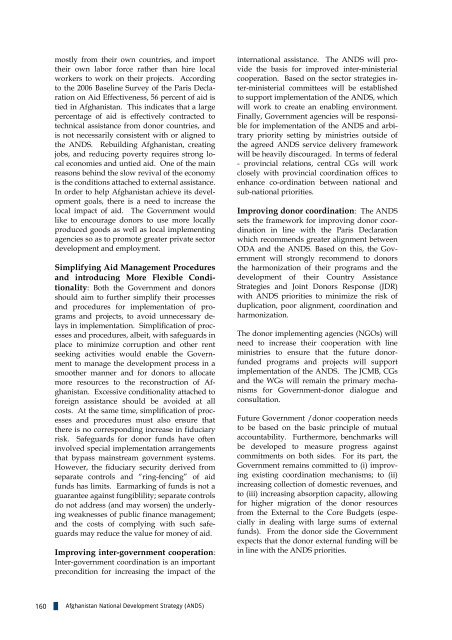Islamic Republic of Afghanistan - Enhanced Integrated Framework ...
Islamic Republic of Afghanistan - Enhanced Integrated Framework ...
Islamic Republic of Afghanistan - Enhanced Integrated Framework ...
You also want an ePaper? Increase the reach of your titles
YUMPU automatically turns print PDFs into web optimized ePapers that Google loves.
mostly from their own countries, and importtheir own labor force rather than hire localworkers to work on their projects. Accordingto the 2006 Baseline Survey <strong>of</strong> the Paris Declarationon Aid Effectiveness, 56 percent <strong>of</strong> aid istied in <strong>Afghanistan</strong>. This indicates that a largepercentage <strong>of</strong> aid is effectively contracted totechnical assistance from donor countries, andis not necessarily consistent with or aligned tothe ANDS. Rebuilding <strong>Afghanistan</strong>, creatingjobs, and reducing poverty requires strong localeconomies and untied aid. One <strong>of</strong> the mainreasons behind the slow revival <strong>of</strong> the economyis the conditions attached to external assistance.In order to help <strong>Afghanistan</strong> achieve its developmentgoals, there is a need to increase thelocal impact <strong>of</strong> aid. The Government wouldlike to encourage donors to use more locallyproduced goods as well as local implementingagencies so as to promote greater private sectordevelopment and employment.Simplifying Aid Management Proceduresand introducing More Flexible Conditionality:Both the Government and donorsshould aim to further simplify their processesand procedures for implementation <strong>of</strong> programsand projects, to avoid unnecessary delaysin implementation. Simplification <strong>of</strong> processesand procedures, albeit, with safeguards inplace to minimize corruption and other rentseeking activities would enable the Governmentto manage the development process in asmoother manner and for donors to allocatemore resources to the reconstruction <strong>of</strong> <strong>Afghanistan</strong>.Excessive conditionality attached t<strong>of</strong>oreign assistance should be avoided at allcosts. At the same time, simplification <strong>of</strong> processesand procedures must also ensure thatthere is no corresponding increase in fiduciaryrisk. Safeguards for donor funds have <strong>of</strong>teninvolved special implementation arrangementsthat bypass mainstream government systems.However, the fiduciary security derived fromseparate controls and “ring-fencing” <strong>of</strong> aidfunds has limits. Earmarking <strong>of</strong> funds is not aguarantee against fungiblility; separate controlsdo not address (and may worsen) the underlyingweaknesses <strong>of</strong> public finance management;and the costs <strong>of</strong> complying with such safeguardsmay reduce the value for money <strong>of</strong> aid.Improving inter-government cooperation:Inter-government coordination is an importantprecondition for increasing the impact <strong>of</strong> theinternational assistance. The ANDS will providethe basis for improved inter-ministerialcooperation. Based on the sector strategies inter-ministerialcommittees will be establishedto support implementation <strong>of</strong> the ANDS, whichwill work to create an enabling environment.Finally, Government agencies will be responsiblefor implementation <strong>of</strong> the ANDS and arbitrarypriority setting by ministries outside <strong>of</strong>the agreed ANDS service delivery frameworkwill be heavily discouraged. In terms <strong>of</strong> federal- provincial relations, central CGs will workclosely with provincial coordination <strong>of</strong>fices toenhance co-ordination between national andsub-national priorities.Improving donor coordination: The ANDSsets the framework for improving donor coordinationin line with the Paris Declarationwhich recommends greater alignment betweenODA and the ANDS. Based on this, the Governmentwill strongly recommend to donorsthe harmonization <strong>of</strong> their programs and thedevelopment <strong>of</strong> their Country AssistanceStrategies and Joint Donors Response (JDR)with ANDS priorities to minimize the risk <strong>of</strong>duplication, poor alignment, coordination andharmonization.The donor implementing agencies (NGOs) willneed to increase their cooperation with lineministries to ensure that the future donorfundedprograms and projects will supportimplementation <strong>of</strong> the ANDS. The JCMB, CGsand the WGs will remain the primary mechanismsfor Government-donor dialogue andconsultation.Future Government /donor cooperation needsto be based on the basic principle <strong>of</strong> mutualaccountability. Furthermore, benchmarks willbe developed to measure progress againstcommitments on both sides. For its part, theGovernment remains committed to (i) improvingexisting coordination mechanisms; to (ii)increasing collection <strong>of</strong> domestic revenues, andto (iii) increasing absorption capacity, allowingfor higher migration <strong>of</strong> the donor resourcesfrom the External to the Core Budgets (especiallyin dealing with large sums <strong>of</strong> externalfunds). From the donor side the Governmentexpects that the donor external funding will bein line with the ANDS priorities.160<strong>Afghanistan</strong> National Development Strategy (ANDS)
















